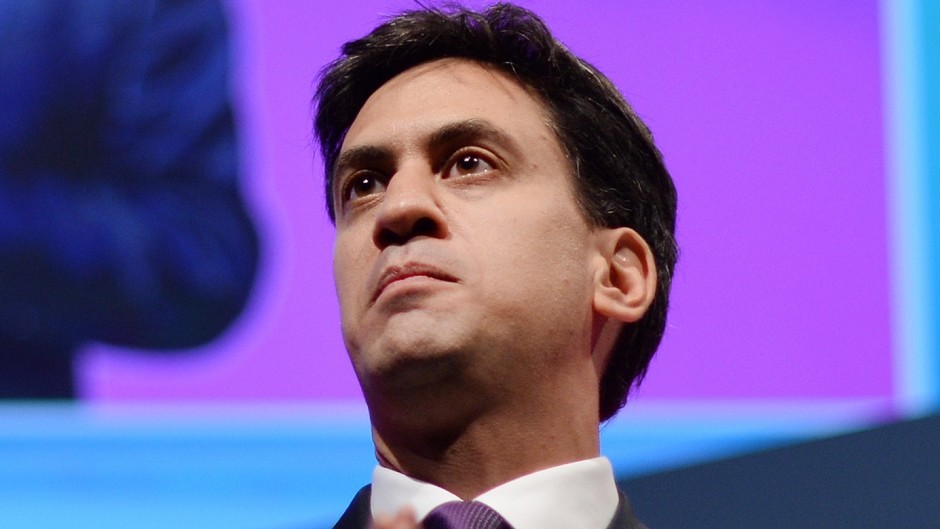Ed Miliband has unveiled plans to put the lessons learned from Scotland’s independence referendum at the heart of his bid to win the keys to Downing Street.
The Labour leader vowed to take the “Better Together” message from the campaign north of the border to doorsteps across the UK in the run-up to May’s general election.
From giving votes to 16 and 17-year-olds, to ploughing billions of pounds into protecting the NHS, the impact of the historic ballot was clear throughout his keynote speech to his party’s conference.
Mr Miliband sought to contrast his vision with that of the man he hopes to succeed – claiming Prime Minister David Cameron had failed to heed the message from Scots.
Turning his fire on the Conservative leader, amid an ongoing stand-off between the pair over further devolution, he said: “If David Cameron cares so much about the Union, why is he seeking to divide us?
“He is learning the wrong lessons from Scotland.
“What he doesn’t understand is that the lessons are of course about the constitution, but they are not about playing political tactics about England.”
During the 65-minute address to delegates he added: “We are more than ever four countries and one.
“Each nation making its contribution, we are not just better together, we are greater together. That is not something to fear, that is something to be proud of.
“The injustices facing working people face them right across the UK. We can only tackle them together. That is after all what we spent the last two years fighting for.
“I am not going to let anyone – after the last two years – drive us apart.”
Mr Miliband also pledged to complete the “unfinished business” of reform of the House of Lords and reverse a “century of centralisation”.
He said it was time to devolve power in England through a constitutional convention led by the people, adding: “It can’t be some Westminster stitch-up.”
The speech was made in the same conference hall where Mr Miliband became leader four years ago, having defeated his brother David in a bruising leadership election.
Under pressure amid poor personal poll ratings, he admitted that he would be having a job interview with the entire British public over the next eight months for the most important post.
He put protecting the future of the NHS at the heart of his offer to voters, an issue which was also key in Scotland’s referendum.
Pledging £2.5billion a year to health, Mr Miliband paved the way for the recruitment of 20,000 more nurses, 8,000 more GPs, 5,000 more care workers and 3,000 more midwives by 2020.
The cash would come from a new annual “mansion tax” on £2million-plus homes, a US-style levy on cigarette manufacturers and a promise to find ways to close tax loopholes the party says cost the Treasury £1.1billion.
In a passage that was greeted with a standing ovation, Mr Miliband said: “The NHS is sliding backwards under this government. They are privatising and fragmenting it. Just think what it would look like after five more years.
“We built the NHS. We saved the NHS. We will repeal their Health and Social Care Bill and we will transform the NHS for the future.”
Mr Miliband stressed the party’s commitment to fiscal discipline, insisting a “world class” country could be achieved without “big spending”.
He laid out a series of goals the party would aim to achieve by the end of a second term.
Doubling the number of first-time buyers to 400,000 a year, boosting apprenticeship take-up until it matches the number going to university, halving the number of low-paid workers and creating a million new “green” technology jobs were all part of his “national mission”.
Labour had already opened the conference with a pledge to raise the minimum wage to £8 an hour by 2020 as the best way of “rewarding the talents of all”.
“Can anyone build a better future for the working people of Britain? That is the general election question,” Mr Miliband said yesterday.
“Our task is to restore people’s faith in the future.”
In a rallying cry to supporters before the election, Mr Miliband said: “Friends, in eight months time, we’re going to call time on this way of running the country.
“Because ‘you’re on your own’ doesn’t work for you, it doesn’t work for your family, it doesn’t work for Britain.
“Can we build a different future for our country? Of course we can.
“But with a different idea for how we succeed. An idea that in the end won this referendum.
“An idea that is just one simple word. Together.”
